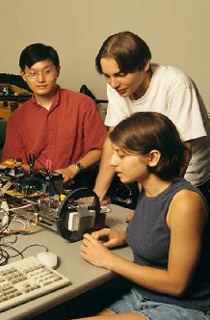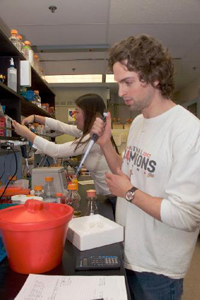Getting Started in Undergraduate Research
WHAT IS RESEARCH?
research. n. Scholarly or scientific investigation or inquiry. Close, careful study.
Defining research is as difficult as explaining how gravity works. As members of an academic community, we are well aware of its tremendous effects yet are simultaneously at a loss to fully explain or comprehend this complex entity. There are people with the term loosely Scotch-taped into their titles, and then there are societies and buildings with the term plastered left and right. One might become so flustered in defining the term as to give up and consider the matter a fruitless endeavor.
The "Truth" about research is that it means something different for each individual. Research is a tool that solves problems. But more so, research often is a journey that encompasses many experiences. Sometimes there is active pursuit like a cheetah chasing a gazelle across the open savannah. But often, it is an engaging process by which there are accidental discoveries. Research has changed people's lives for better and for worse. There really isn't one way to think about it or its effects, only to acknowledge that in this journey you are about to embark upon—in becoming one of these so-called researchers—you will see, learn, and do things that you never imagined. Through research you develop objectives and work hard toward goals. But along the way you will pick up so much more. Tacit information, keen insight, and acumen for solving some of life's greatest mysteries will lead toward your becoming a student for life.

Before you get started in "research," it is important to identify your goals and objectives in joining this pursuit. What are your expectations for becoming involved in college-level research projects? How committed are you to a project in terms of time, energy, and enthusiasm? How will you evaluate your experience? Knowing what you can contribute and what you hope to develop through research will not only help you to find a great position, it will help you make the most of it.
Research comes from the old French word cherchier, which means to search. The opportunities before you at Cornell, a world-class institution, the largest Ivy League research university with strengths in all areas from humanities to life sciences, grants you opportunity to search out your interests and new self-identity. As much as we hope our research will have a positive long-term impact on society, it is also important to acknowledge that it will forever change our lives.
WHAT IS THE PROCESS?
"The How-To Manual of Undergraduate Research"
by Dean Marilyn Williams, retired
All professors at Cornell regularly guide undergraduates in research projects. They are all internationally recognized leaders in their fields of study. Faculty in the sciences involve many people, including undergraduates in their projects. Faculty in the social sciences and humanities are happy to help students find their way to projects they will learn from, so long as the topic lies in the range of faculty member's expertise. The important thing is to find the project that you will learn the most from, guided by a faculty member whose habits of mind are compatible with your own, at least, when you are first starting this process.
How can you learn who is doing what, in the way of research?
In the sciences it's usually easy. Internet websites tell the story of current research in a paragraph or two and the bibliography tracks the story to date. Partly because of the way we go about research in the humanities and social sciences, the faculty in these fields don't generally set out a paragraph about their current research interests. For them, as for the scientists, the titles of their articles usually provide a good outline of where they have been, if not exactly where they are going next.
How will you know what kind of project will be right for you?
Pay attention to your reaction as you read those descriptions. We all usually react positively to all the topics. Were it not so, you'd wonder what made you think you were interested in that field. One or two topics, however, are likely to grab you; before the words even shape themselves, you know you'd like to get involved in that kind of thing. Those are your first clues.
Learn more. E-mail the professor to schedule an appointment during her or his regular office hours. Tell the professor that you saw she/he was working on (fill in the blank), and, you are interested because (fill in the blank). For the second phaase, make yourself aware of what it is in your background that connects to those projects you find thrilling – there must be connections for you to experience that reaction. Some of those connections may seem babyish to you; don't hold back. That kind of experience is very authenticating. Entomologists are sometimes found by their field when they are about three years old.
Between the call and the time of the appointment, read one of the research articles listed on the faculty member's website. Don't worry if you can't understand it all. You may find that it is not all what you supposed, in which case, you cancel the appointment. Otherwise, this reading will help facilitate your conversation with the professor.

How do you get involved?
When the conversation swings, it's time to say that you'd like to get involved in such a project. Ask whether the professor can help you do that. (Marketing 101, cold calls and yes/no questions are a sure miss.) Never fear, the professor's first answer will relate to whether she/he is willing to sponsor your project.
Usually the first answer is, "No; I'm too busy," or "You'll learn more if you take English 320 first." Often, you make plans to do a project after that obstacle has been removed. Sometimes, the professor suggests another professor to contact. That is not a way of saying "go bother somebody else," rather; she/he senses that there will be more for you in a project with that other professor. Follow the advice.
Just in case you and the professor decide you want to get started on a project right away, be sure to carry an Add/Drop form and Independent Study proposal form with you to the meeting. Then you can cut the deal on the spot. In case the answer is "no," but you still wish you could get started working under this professor's guidance, ask, "May I leave this with you, in case anything should change?" "This" is your skills resume. Frequently, a good project for you will jump into a professor's mind within a day of your conversation. Your e-mail address will re-connect you.
[Here ends Dean Williams's "How-To" document]
WHAT IT TAKES: PERSISTENCE
Imagine you're trapped on a deserted island and the only form of sustenance is coconut. It takes some time to get through the husk and break the rigid shell, but once you're in, you're in paradise. One common theme when people get started doing research is a process with one barrier to entry. That barrier is that you must demonstrate your indestructible desire to become involved. Many researchers will tell you that research is thrilling and worth every sacrifice, 1 percent of the time. The remaining 99 percent of the time is dedicated hard work. Persistence in finding a job will pay off when you need it again to find results.
Don't give up on account that becoming involved in research is difficult. The excuse that you have no experience and thus no one will hire you is ridiculous. College is a time for eager exploration. You are expected to learn and as such, professors are more than willing to teach if you have the self-motivation. Ultimately, if you do become involved in research and you find it painful agony, you might as well go find a job. Work is a four-letter word. Research is not work, it is a passion of possibilities to getting involved. You must take the first step and find a position that stirs your excitement. Keep your wits about you, and find the stuff that floats your boat.
Credit or Pay?
Research is a dedicated commitment and, as such, requires compensation. The sheer enjoyment of pursuing your interests certainly tops the list of personal rewards; however, you must also take into account the opportunity costs associated with spending hours in this endeavor. Cornell offers many opportunities that recognize the contributions of students.
Credit – Many departments award academic credit in variable amounts to students who file for an independent study. How can you beat a faculty to student ration of 1 : 1? Credit is a great way to enhance your academics in a structured setting.
Pay – Many research positions are paid. It's a great opportunity to use work-study while engaging in a stimulating setting.
Contact
Office of Undergraduate Research
501c Day Hall
Cornell University
Ithaca, NY 14853
(607) 255-6445
Email: undergradresearch@cornell.edu
